Insights from our Advisory Board - Prof. Umberto Saccone - Intelligence & Corporate Security
Published on 17th May, 2023
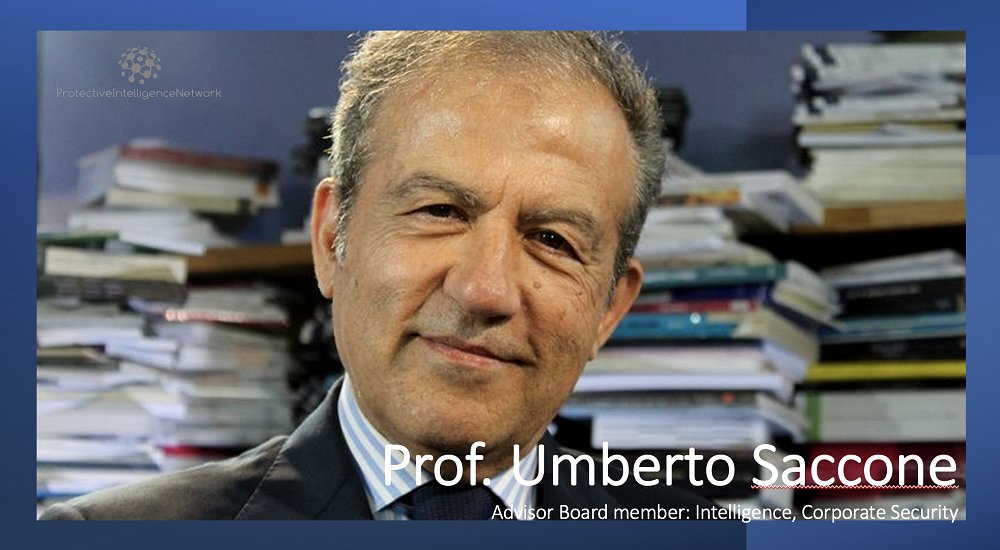
We are excited to announce that we will be starting our "Insights from the Protective Intelligence Network Advisory Board" campaign with a writing proposed by Prof. Umberto Saccone.
Mr. Saccone has an impressive background, having worked for over 30 years in the security industry. He has held various leadership positions at major international firms, and is currently a Partner at EY (Ernst & Young), where he leads the Security and Resilience practice in Italy and west Europe.
Umberto Saccone, also the current Director of the Master course on Intelligence & Security at Link Campus University and Adjunct Professor at Luiss Business School in Rome, served in the Carabinieri, one of Italy's main law enforcement agencies, and the Italian Intelligence Service 'SISMI' for more than 2 decades.
Within the Italian intelligence service, Saccone covered different important positions; he was initially Manager in the Counter-Intelligence Division, and successively become Director of the Operation Center in the Italian capital, Rome. Head of the Asia Department and Deputy Director of the External Relations Office During his time abroad he held operational positions in various countries in the Middle East and in Europe.
In 2006, Saccone became the Security Director of ENI, the Italian multinational oil and gas company, one of the seven "supermajor" oil companies in the world, with operations in 66 countries.
In April 2017, he was appointed sole director of Port Authority Security for the seaports of Civitavecchia, Fiumicino and Gaeta in Italy.
During is career, Saccone has written numerous articles for different newspapers and specialised magazines, and authored books including "La security aziendale nell'ordinamento italiano”, published by Il Sole 24 Ore in 2011, "Governare il rischio - Un sistema di Security Management", published by Aracne in November 2014, and "Protocollo S – Sequestro di persona", also published by Aracne in 2019.
Here following his proposal for "Insights from our Advisory Board".

" It is now a truism to say that 90 percent of the information that policy managers need to make informed decisions is practically public. This is also confirmed in the private sector where investigative journalists, academics, and researchers draw from the world of open sources, giving value to their research. The Central Intelligence Agency (CIA) itself, through the "Foreign Broadcast Information Service" (FBIS) of the Science and Technology Directorate, monitored, translated, and disseminated openly available news and information within the U.S. government.
In November 2005, the structure was merged into the Open Source Center (OSC) and then became the Open Source Enterprise (OSE), incorporated into the Digital Innovation Division as a center of excellence for public data collection.
In December 2022, the agency appointed Randy Nixon as director of the Open Source Directorate. It is an exciting moment for the industry, which is enriched with the opportunities of artificial intelligence and machine learning, for global screening capabilities. As stated, all of this can still satisfy 90 percent of the information needs, but it is the remaining 10 percent that can be crucial for policymakers.

It is on this 10 percent that intelligence activities, together with so-called "covert actions," constitute the necessary structure for influence, disinformation, sabotage, propaganda, and last but not least, targeted killings.
For skeptics, I remind you, for example, of the assassination on November 23, 2006, of former KGB agent Alexander Litvinenko, who was poisoned with a few drops of radioactive polonium administered with a cup of tea in a London hotel, or the failed attempt to kill former Russian intelligence officer Sergei Skripal, who had passed information to the UK's secret services for years, and his daughter Yulia, both poisoned with a nerve agent, Novichok, developed and produced by the Russian army, in Salisbury on March 4, 2018. [Image UK police in Salisbury]
A powerful neurotoxin developed in the Soviet Union first and then in Russia in the '80s and '90s, which, once inhaled or in contact with the skin, can lead to death in a few minutes.
However, such operations are part of the DNA of some intelligence agencies and have their roots in the history of secret services. It is difficult not to remember the story of the so-called "Bulgarian umbrella."
On September 7, 1978, the well-known Bulgarian writer and journalist Georgi Markov, a dissident voice of Radio Free Europe (RFE), was poked with an umbrella by an unknown person on Waterloo Bridge in London. Markov felt a sharp pain in his right thigh, similar to a puncture, but did not pay much attention and went to work. That evening, he experienced high fever and pain in the leg that had been hit. On September 11, Georgi Markov died of cardiac arrest. The autopsy revealed a platinum and iridium microcapsule in his right thigh containing traces of ricin, a powerful plant-derived cytotoxin for which there was no valid antidote at the time.
It was presumably injected into him during the encounter with the unknown person wielding the umbrella.
In a July 17, 2022 interview with Luca Fazzo of "Il Giornale," I emphasized how regimes, secret service acronyms, motivations of "moles," and methods may change, but one thing remains constant: Moscow's old habit of meddling in Italian affairs.
I added that it is in the nature of things, a basic function of every intelligence structure to strive to understand and influence what is happening in more or less hostile countries. The entire Western world was subjected to these operations during the Soviet Union era, is still being targeted by the Russian Federation today, and will continue to be so in the future. There is no reason why Italy should remain exempt from these maneuvers. In fact, given its increasingly strong Atlantic position, it remains a top priority and will continue to grow as such. If we can assume that the era of globalization is over and we are moving towards a world of opposing blocs, it is inevitable to presume that in the future the aggressiveness of foreign services will be even more intense.
It is even tautological to state that the military attack unleashed on February 24, 2022, against Ukraine, where Italy has emphasized its full support for Kiev's territorial integrity, will make it even more necessary for Russia to carry out clandestine operations in our country.
There is a part of the activity that takes place and will continue to take place through official diplomatic channels, and then there is the more insidious activity that involves illegal operations such as the recruitment of individuals who can provide a contribution to the Russian cause. These figures typically correspond to two profiles: individuals who can decide, due to the roles they play in public or private institutions, or individuals who can influence.
Today, this second resource is particularly valuable. We talk a lot about influencers; well, intelligence services have their influencers too.

Politicians, journalists, and all those who are capable of acquiring information and influencing public opinion and people's beliefs are valuable targets.
The usual levers are sex and money. A good secret agent has the ability to understand the weak point of the subject they want to recruit and works on it progressively, day by day, until they ensnare their target.
The case of Maria Adela Kuhfeldt Rivera, an illegal agent of the GRU, is textbook.
Her identity began to be constructed in August 2005, and by 2017, we find her at the NATO Joint Force Command in Naples with a sufficiently solid identity to allow her to establish relationships with members of the US Navy. When her identity was discovered, she disappeared into thin air, on a flight to Moscow, on September 15, 2018.
But let's not forget among the many categories of agents, the so-called "useful idiots".
Useful idiots are those who, in good faith, are conditioned without realizing it, and then become the ones who defend with the most disparate arguments, for example, the Russian point of view on the war in Ukraine, in social media or debates. The SVR, the secret service heir of the KGB, has great experience in this type of activity.
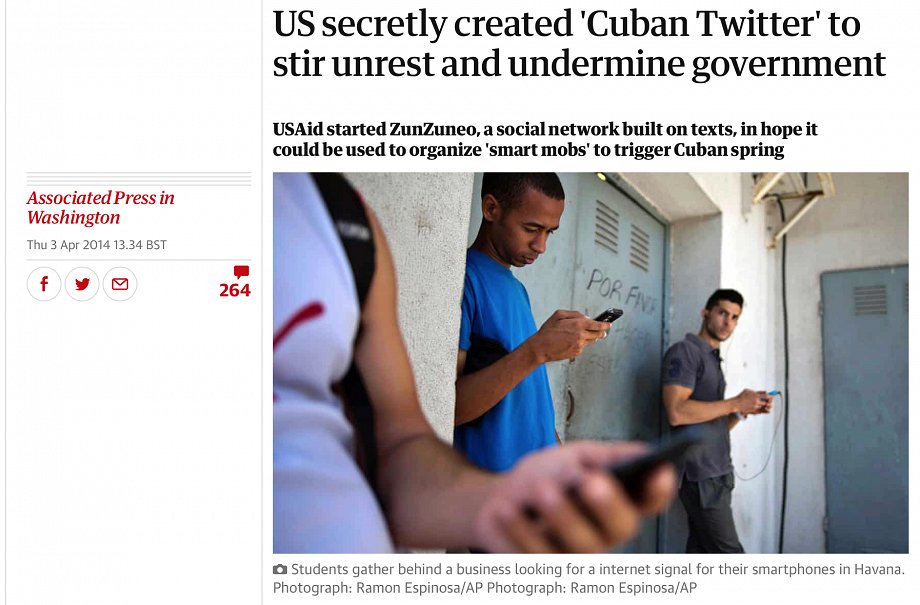
But this should not surprise us, as these methods are also used by opposing factions. In 2010, the American government secretly financed the social network Zun-Zuneo through the US Agency for International Development, to circumvent the Cuban regime's blockade of Facebook.
Zun-Zuneo's direct goal was to create the conditions for a popular uprising in Cuba. Through this social network, American intelligence circulated slogans, theses, news, and points of view capable of creating discontent among the island's population.
I ask: if a government of our ally, a great Western democracy, resorts to these kinds of methods to achieve its strategic goals, what can we expect from Russia?
The interview with "Il Giornale" raised some doubts and on social media it became evident that the reflection was not entirely shared. Some accused me of having an outdated view compared to what modern intelligence is capable of achieving.
The most obvious response, in the absence of further non-dogmatic evidence but based on empirical evidence, could have been found by referring to Sun Tzu, who lived 500 years before Christ, and who in his 'Art of War" (at least attributed to him) extensively talks about intelligence. The relevance of his arguments on what is defined as one of the oldest professions in history (I am not referring to Rudyard Kipling's references to prostitutes in the brothels of ancient Rome, the free and wealthy "etere" in Athens or the Babylonian naditu, but rather to an activity stigmatized by the Chinese philosopher in his work which is still considered a classic of strategic studies) cannot be denied.
In 1975, this text was reworked at Harvard University, which published the famous volume "The Art of Negotiation."
Obviously, there are also other works on management and marketing that draw inspiration from Sun Tzu's text, seeking in classical education inspiration to manage market criticalities and train leaders capable of managing conflicts. But fate sometimes dictates that answers can be found in facts and events. Events that in this glimpse of the now past 2022 exploded, overlapping and confirming the assumption.

In December 2022, after over a year of investigations, Belgian investigators dismantled a network that could involve over 60 Eurodeputies. The counter-espionage operation effectively thwarted the heavy infiltration of Qatar into Brussels institutions to influence the decision-making processes of the European Commission.
The "Qatargate" is configured as a spy story in which the Moroccan secret service and the government of Qatar play a leading role. Rabat and Doha in the parts of the great corrupters within the EU institutions, especially the Parliament.
And again, in October 2022 came the news that the Iranian regime, crossed by a protest wind from Isfahan to Rasht, on the shores of the Caspian Sea, passing through the Iranian Kurdistan in the west, uses agents scattered all over the world to monitor, denounce, and strike at regime opponents abroad who express themselves critically against Tehran's policies.
Iranian expert Hamid Hosravi of the Asia-Orient Institute at the University of Zurich confirms the extension of the regime's arm beyond national borders.

During the last few weeks, following the death of Mahsa Amini and the demonstrations against the regime, the international community has increased pressure on the Islamic Shiite Republic. At the same time, Tehran has reacted by increasing its espionage activities abroad.
These activities recall the death of Mohammad Hossein Naghdi, a member and representative in Italy of the National Council of Resistance of Iran, assassinated on March 16, 1993, in a terrorist attack in Rome, in via delle Egadi. He arrived in Italy in 1981 as a chargé d'affaires at the Iranian embassy in Rome, and the following March decided to break with the Islamic Republic, disillusioned by the obscurantist drift of the revolution led by Ayatollah Ruhollah Khomeini. He returned his diplomatic passport to Italian authorities and became one of the leaders of the Iranian Resistance in Italy.
These regimes, therefore, use their security services to influence, recruit, strike dissidents, opposition members, and ethnic minorities as they are often seen as a threat by the governments of their home countries.
Last, in chronological order, are the articles that appeared in the national press in December 2022 which, taking up the report "Patrol and Persuade" by the Spanish NGO "Safeguard Defenders", wanted to emphasize the presence of Chinese police stations in Italy that have raised concerns among the government and national intelligence. Established formally as centers to provide administrative assistance to Chinese nationals abroad during the Covid-19 pandemic, the stations are believed to be used by China to monitor, prosecute, and in some cases repatriate exiles and dissidents, relying on bilateral security agreements signed with host governments.
These very aggressive initiatives fall within the broader activities that China has implemented in the last 20 years and are carried out indiscriminately by government agencies, the People's Liberation Army, state-owned enterprises, private companies, and various universities.
Moreover, it should not be forgotten that the Ministry of State Security (MSS), or "Guoanbu," is a Chinese government body with secret police functions and espionage and counter-espionage tasks, which uses social media and border control to obtain sensitive information and organize its control activities towards dissidents and recruitment towards foreigners with access to sensitive information.
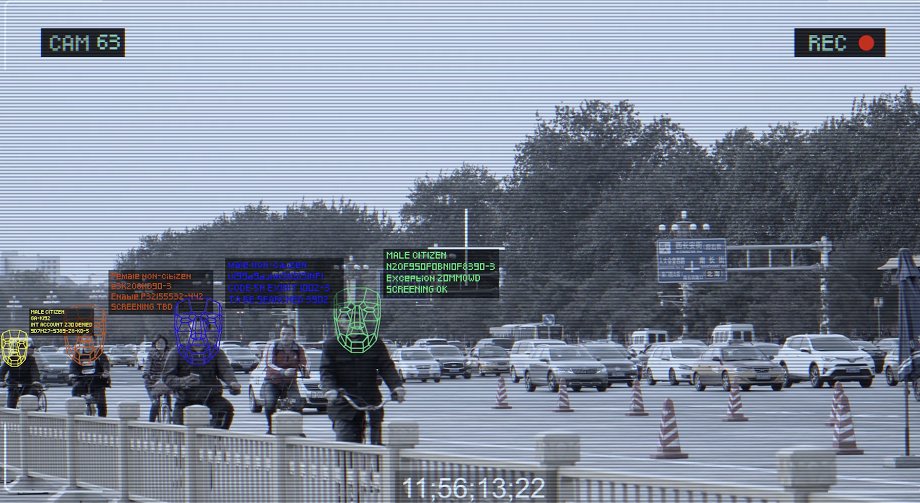
Although much of China's traditional spying activities are directed against Taiwan, Beijing is able to pose serious threats to European national and economic security through attempts to penetrate government agencies and the decision-making processes of companies with strategic relevance.
However, the activity that is increasingly evident is that which is carried out against dissidents by what can be defined as the largest national security agency on the planet. Among their main targets are Falun Gong, which, according to Chinese authorities, is the quintessence of xie jiao ("heterodox teachings or evil cults"), and the Uighurs of Xinjiang. Both, with tens of millions of followers, greatly concern the government of Xi Jinping.
The Falun Gong movement, also known as Falun Dafa, founded in China in the early 1990s by the Chinese citizen Li Hongzhi, is a Chinese spiritual discipline that consists of meditation practices and qigong exercises accompanied by a series of precepts and teachings aimed at revealing "enlightenment" and the Absolute Truth to its followers. Over the years, the mainstream media has provided a simplified description of the case, describing it as the repression activated by Beijing against a religious/spiritual movement, omitting the anti-systemic drifts that the founder, presumably in light of the unexpected mass success, wanted to highlight.
The prevalent narrative also conceals the probable "external interference," which has believed, and still believes, that it can discern in the movement a tool capable of effectively conveying elements of destabilization within China.
Although the movement initially received a favorable reception from Chinese authorities, who saw it as one of the many qigong associations already active in the country, the pseudo-religious tone attributed to it by Li Hongzhi and the absolute obedience required of followers in exchange for the Revealed Truth soon highlighted, according to Beijing, the subversive intentions towards the established order of the country and its prevailing value system.
Acknowledging the destabilizing intentions that the movement was displaying and its pervasiveness and penetrating capacity in all strata of Chinese society, including institutional circles, the then-leader of the Chinese Communist Party, Jiang Zemin, in 1999 decreed the banning of the movement due to its subversive goals, prohibited its practice, and launched a large-scale judicial and investigative campaign aimed at dismantling the organization on Chinese soil.
At the same time, on June 10, 1999, the 610 Office of the police was secretly established with the task of supervising the persecution of Falun Gong and other xie jiao.
Nevertheless, the movement has become the worst nightmare for China's image and public relations in the world. Falun Gong believers, many of whom are expatriates, have founded successful communities abroad and organized daily demonstrations against the CCP in front of Chinese embassies and consulates, and wherever Chinese regime officials travel.
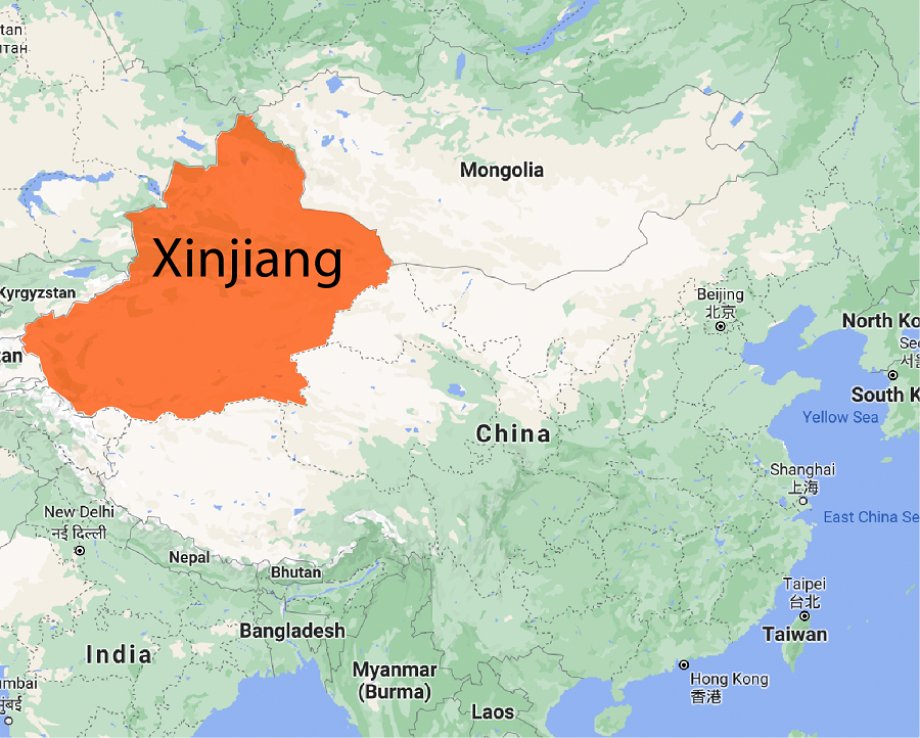
The situation of the Uyghur community, a Turkic-speaking Islamic ethnic group located in the Xinjiang region in northwestern China, has a different background.
The objectivity of our narrative leads us to reflect on the Uyghur issue, which at first glance can be classified as a systematic repression action conducted by Beijing against Uyghur Muslims. Such a description, which omits any reference to the security implications of the Uyghur issue, makes the issue more complex than it is usually presented.
The dissolution of the Soviet Union and the consequent birth of the Republics of Kazakhstan, Kyrgyzstan, and Tajikistan, neighboring the Xinjiang province, have revitalized the separatist aspirations of various Uyghur movements that, in order to pursue the goal of establishing the independent state of East Turkestan, have established solid operational ties with al-Qaeda since the 1990s, which has provided them with funding and training in its camps in Afghanistan, and with the Islamic Movement of Uzbekistan (IMU).

Among these, the East Turkestan Islamic Movement (ETIM), included by the United Nations in the list of terrorist groups in 2002 and removed in 2020 as it was dissolved (in reality, it has recently acquired the name of Turkestan Islamic Party -TIP). The ETIM soon raised its level of activity by perpetrating a series of attacks both inside Xinjiang and elsewhere in Chinese territory (a dynamite attack in 2013 caused five casualties in Tiananmen Square in Beijing, while an attack in the Kunming subway caused about thirty casualties).
As evidence of the persistent vitality of Uyghur-based jihadism, it is worth highlighting its active presence in the recent Syrian war scenario, where a "Uyghur brigade," whose numerical entity has been estimated at between 3,000 and 5,000 units, has particularly distinguished itself alongside the al-Qaeda-influenced formation of Jabhat al-Nusra and, subsequently, of Hay'at Tahrir al-Sham, in controlling the Idlib Governorate in northern Syria.
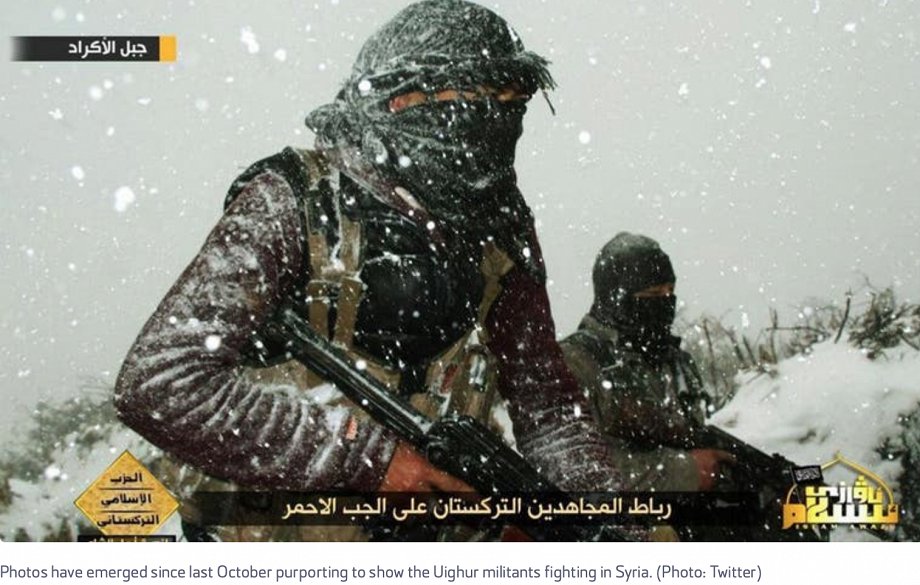
Although the majority of the Uyghur population present in Xinjiang likely does not cultivate separatist tendencies, it is evident that:
- the persistent vitality of Uyghur extremism;
- the support of a growing international jihadist network, including the likely support of some foreign state entities (or sectors of them);
- the risk that destabilization elements may penetrate a province that is of primary strategic interest for the energy and mineral resources it possesses;
constitute a constant cause of concern for Beijing.
The above, of course, far from justifying or downplaying probable human rights violations perpetrated by Chinese authorities on-site, appears, however, useful in integrating a prevailing media narrative that reduces the Uyghur issue to the mere repression of a linguistic and religious minority, neglecting the complexity of the security situation created in the region and, as mentioned above, well beyond its borders.
But the element of this analysis is to highlight how China has managed to penetrate the international relations system over the years and overturn it according to its interests, with cunning and, unfortunately, also with extreme ease, in a scenario where intelligence services, effective communication, the widespread presence of Chinese citizens on our territories, and global political initiatives have certainly had an impact on our perceptions.
Among these, the initiative launched in 2013 by current President Xi Jinping assumes strategic importance: the New Silk Road, a real rebranding activity by the leaders of the People's Republic. China, in fact, has been seeking to change its image since the 1990s: from a potentially dangerous nation to a reliable actor in multilateral politics.
And so, in political speeches and state media, there is an overuse of Confucian tradition, rhetoric of peace, harmony, and cooperation, in contrast to the culture of violence, conflict, and isolation. A strategy capable of reversing the perception of China's role in the international community from oppressor to oppressed." -
Prof. Umberto Saccone

Text translated from Italian Language - Author Umberto Saccone (2023)
Among numerous sources we cite:
- 1) https://www.theguardian.com/world/from-the-archive-blog/2020/sep/09/georgi-markov-killed-poisoned-umbrella-london-1978 )
- 2) https://www.bellingcat.com/news/2022/08/25/socialite-widow-jeweller-spy-how-a-gru-agent-charmed-her-way-into-nato-circles-in-italy
- 3) https://apnews.com/article/technology-cuba-united-states-government-904a9a6a1bcd46cebfc14bea2ee30fdf
- 4) https://www.politico.eu/tag/qatargate-european-parliament-corruption-scandal/
- 5) https://safeguarddefenders.com/en/blog/patrol-and-persuade-follow-110-overseas-investigation
- 6) https://jamestown.org/program/the-610-office-policing-the-chinese-spirit/
- 7) https://edition.cnn.com/2020/07/18/asia/hong-kong-china-falun-gong-intl-hnk/index.html
- 8) https://english.alarabiya.net/features/2016/03/02/China-s-proxy-war-in-Syria-Revealing-the-role-of-Uighur-fighters-
- Belgium Federal Police (image)
- Bellingcat (Image)
- Jamestown Foundation (Image)











